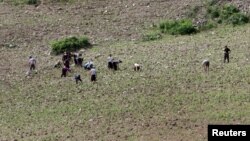The number of North Korean children being treated for severe malnutrition increased more than 30 percent last year, a United Nations agency said.
In a newly released report, the Office for the Coordination of Humanitarian Affairs (OCHA) said the number of North Korean children being treated for severe acute malnutrition jumped by 38 percent in 2014 compared to the previous year.
The report is based on data from the Community Management of Acute Malnutrition (CMAM), a United Nations Children’s Fund (UNICEF) program that provides treatments for children with malnutrition.
According to the report, the increase coincided with the beginning of a drought period, a possible sign that the recent drought affecting North Korean crops might have aggravated children’s malnutrition.
“These figures reflect the deteriorating nature of the situation since mid-2014, in terms of increasing incidence of childhood illnesses associated with higher prevalence of under nutrition and higher utilization of CMAM services,” said the OCHA report.
The North Korean government has reported that 9 percent of agricultural land became unarable due to the drought in 2014. This year, the drought has worsened, with all provinces in the country experiencing less rainfall than the historical average.
OCHA warned that the malnutrition situation could deteriorate due to shortages in oral rehydration salts needed to prevent death from diarrhea.
UNICEF said it is sending more aid to the communist country.
“We are sending more oral rehydration salts, as well as additional micro-nutrients, ready-to-use therapeutic food and special oral rehydration salts to the DPRK to be prepared in case the situation of children further deteriorates,” wrote Christopher de Bono, UNICEF’s regional spokesman in East Asia and the Pacific, in an email to VOA.
The UNICEF official said the agency provided water purification tablets and jerry cans for 1,300 families in Unpha County in North Hwanghae Province, which was known to be one of the areas hardest hit by the drought.
North Korea is facing chronic food shortages and continuing humanitarian needs, with the country’s food production vulnerable to droughts or floods.
According to a survey done in 2012, nearly 30 percent of children under five suffer from chronic malnutrition, while 4 percent of children of the same age group are affected by acute malnutrition.
However, the U.N.’s humanitarian efforts are severely under-funded. In 2015, the U.N. has requested $104 mission to provide humanitarian assistance to North Korea, including food aid, but it has received only $33 million.
Jee Abbey Lee contributed to this report.




